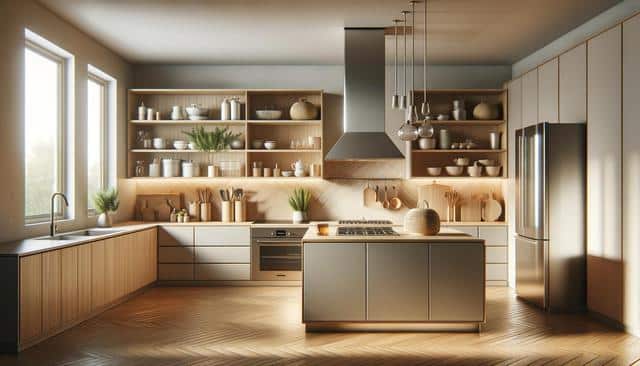Explore Modular Kitchen Designs for a Customizable and Functional Space
Modular kitchen designs offer modern, efficient, and customizable solutions for your home. With pre-fabricated units and clever storage options, these kitchens maximize space while adding a sleek, organized look to your cooking area.

Understanding the Concept of Modular Kitchens
A modular kitchen is designed using individual units or modules that are factory-made and then assembled on-site to create a complete kitchen setup. These modules typically include cabinets, shelves, drawers, and storage units that are tailored to fit the dimensions and requirements of the user’s kitchen space. One of the main advantages of modular kitchen designs is their flexibility. Homeowners can choose layouts, colors, materials, and finishes that align with their personal style and usage needs, making modular kitchens a highly customizable solution.
Each component in a modular kitchen is built to fit together seamlessly, allowing for easy upgrades or replacements. For example, if a cabinet door becomes worn out or a drawer mechanism needs updating, it can be replaced without disturbing the rest of the kitchen. This modular approach not only ensures long-term functionality but also allows for ongoing personalization as trends or needs evolve.
Key elements of a modular kitchen include:
- Base cabinets for storage and countertop support
- Wall-mounted cabinets for overhead storage
- Tall units for appliances or pantry storage
- Functional accessories like corner units and pull-out trays
Layouts That Maximize Space
Choosing the right layout is essential for both small and large kitchen spaces. Modular kitchens can be designed in various layouts to cater to different room sizes and user preferences. Some of the most common modular kitchen layouts include the L-shaped, U-shaped, parallel (galley), straight-line, and island kitchen. Each layout offers distinct advantages, and the choice largely depends on the available space and the household’s cooking habits.
For instance, L-shaped kitchens are ideal for small to medium spaces. They provide efficient work triangles (between the stove, sink, and refrigerator) and allow for easy movement. U-shaped kitchens, on the other hand, offer ample storage and countertop space, making them suitable for larger families or those who cook often. Island kitchens have become increasingly popular in open-plan homes, offering additional workspace and serving as a casual dining or gathering area.
To optimize functionality, it’s essential to plan the layout with workflow and ergonomics in mind. Here are a few tips:
- Ensure there’s enough clearance between counters for easy movement
- Group similar tasks together (e.g., prep zone, cooking zone, cleaning zone)
- Place frequently used items within easy reach
Material and Finish Options
One of the key advantages of modular kitchen designs is the variety of materials and finishes available, allowing homeowners to tailor the kitchen’s appearance and durability to their preferences and budget. Cabinet materials commonly include MDF (Medium Density Fiberboard), plywood, particleboard, and high-density fiberboard. These materials are often laminated or coated to resist moisture and heat, which are common in kitchens.
For countertops, options range from granite and quartz to solid surfaces and laminate. Each material has its pros and cons in terms of maintenance, appearance, and cost. Granite and quartz are popular for their durability and resistance to stains and scratches, while laminate countertops are more affordable and available in a wide range of colors and patterns.
Finish options for cabinets and shutters include:
- Matte: Offers a subtle, non-reflective look that hides fingerprints well
- Glossy: Reflects light and gives a spacious, modern feel
- Textured: Mimics natural materials like wood or stone
By mixing and matching materials and finishes, homeowners can achieve a look that complements the overall design of their home while meeting functional requirements.
Smart Storage Solutions
Modular kitchens are known for their efficient use of space, and much of this comes from smart storage solutions. These kitchens often incorporate innovative mechanisms and accessories to make the most of every inch. From corner carousels to pull-out drawers, each element is designed to improve accessibility and reduce clutter.
Modern modular kitchens often include features such as:
- Pull-out pantry units for easy access to dry goods
- Soft-close drawers and cabinets to minimize noise and wear
- Vertical storage for trays and cutting boards
- Drawer organizers for utensils and cutlery
Even in compact kitchens, modular designs can introduce creative storage solutions that keep countertops clear and essentials neatly tucked away. Tall units can be used to store large appliances or bulk groceries, while overhead cabinets can house less frequently used items. The goal is to create a kitchen that is not only beautiful but also practical for daily use.
Customization and Personal Expression
One of the most appealing aspects of modular kitchen designs is the ability to reflect personal style. From the layout to the color palette, homeowners can create a kitchen that suits their lifestyle and aesthetic preferences. Whether you prefer a minimalist look with sleek lines and neutral tones or a more traditional design with decorative finishes and warm colors, modular systems support a wide range of styles.
Customization goes beyond appearance. It also includes functionality—like choosing the height of countertops, adding task lighting under cabinets, or integrating built-in appliances. These choices help create a kitchen that works for your specific needs, whether you’re an avid home cook or someone who prefers quick, easy meals.
When planning your modular kitchen, consider:
- Your cooking habits and how you move through the space
- The types of appliances you use regularly
- The amount of storage you need for food, cookware, and utensils
- The overall style of your home and how the kitchen can complement it
With the right design approach, a modular kitchen becomes more than a place to cook—it becomes a space that enhances your daily routine and adds value to your home.